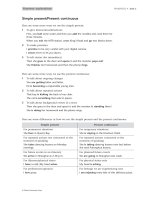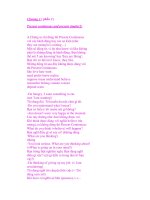23505 present simple x present continuous
Bạn đang xem bản rút gọn của tài liệu. Xem và tải ngay bản đầy đủ của tài liệu tại đây (465.35 KB, 5 trang )
I - Complete the sentences with the verbs in the PRESENT SIMPLE
or the PRESENT CONTINUOUS tense (see grammar notes on page 4 ):
1
In a well-used kitchen in west London, it’s 6:30 pm. and Anna
…….………………………………..…….. (cook) supper.
2 It……………….(be) a variation on a Jamie Oliver recipe: grilled fillets of fresh
pink fish.
3
“Anna………………………………………………………..…… (constantly - read) cookbooks”, her
boy friend .…………………………………………....(say)
4
Before he met her he thought his meals were healthy enough.
He…………………………(look)much healthier and ……………………..…(feel) much
5
6
better now.
Why …………………………………………... (so many of us still - eat) so poorly these
days?
Partly, of course, it's about money: healthy food, in general, ………………….(cost)
more than unhealthy food .
7
Researchers ………………………..…(think) it…………………………….(be) more often a
problem
8
of dietary imbalance than under-nourishment.
Scientists found out after a special survey that even people who ……………..
……………………….(do) well financially and socially …………………………(eat)
ever greater quantities of junk, fast and processed food too.
9
One of the reasons is that - whatever Jamie Oliver ………………….. (say) - when
we're tired or it's late ready meals ……………………………(be) easier and quicker.
10
Sugary, fatty and processed foods usually…………………………………….... (taste) really
good.
11
Sheila, ………………………………………………… (always – cook) a meal for herself and
her son, Tyrone.
12
“It ……………………………..(shock) me that some parents ………………………………. (not
take) the time to cook," she……………………………….(say). She ……………………….
(not work) full time and …………………………………………….. (get by) with her 13year-old son on £120 a week.
13 At the moment, she ………………………………………(prepare) a chicken curry, with
vegetable rice and salad, in her clean small kitchen. Generally, she……….(buy)
the food she …………………….….(need), spending maybe £50 a week.
14 On Fridays, when she …………………………(work) late, there might be a frozen
ready meal. However, she ………………………..…(tend) to cook big the night before.
Adapted from < />
II – Make questions with these words. Choose the correct tense of the verb: present simple or present
continuous? Then, answer the questions with short answers. Read the model.
MODEL: practical/ ready meals/ be/ but/ help / they people/ to eat/ healthily?
• Ready Meals are practical, but do they help people to eat healthily?
• No, they don’t.
1.
still / cook book /that/ spare/ you/ in your/ time/ write?
……………………………………………………………………………………...................................................................
………………………………………………………….
2. the Spanish and Italians/ cook/ home-made meals/ the British/ more often/ than/?
…………………………………………………………………………............................................................…………………………
.................................................................
3. do/ an evening/still/ your mother/ in traditional / course/ British cooking?
…………………………………………………………………………………......................................................
…………………………………….
4. sometimes / cook/ your own / you / dinner?
……………………………………………………………………...................................................................
……………………………………..
5. believe / ready meals/ health experts/ our health /be / good/ for/?
……………………………………………………………………………………………………………………………………..
…………………………………….
6. fruit and vegetables /try /you and your friends/this week/ / to eat/ more?
………………………………………………………………………………………………………………………………………………….
…………………………………………………………………………………………..
7. your mother/ fresh food /buy/online?
…………………………………………………………………………………………………………………………………………………
……………………………………
8. how / eat out / you and your family/ often?
……………………………………………………………………………………………………………………………………..
………………………………………………………………………………..
III – Tick the correct sentence:
1. a She’s thinking about buying a new cooker.
b She thinks about buying a new cooker.
2.
a I’m hearing strange noises in the kitchen, aren’t you?
b I can hear strange noises in the kitchen, can’t you?
3. a. This cake is tasting so good!
b. This cake tastes so good!
4. a. Why is she smelling the fish?
b. Why does she smell the fish?
5. a.
b.
She’s being too stubborn! She insists that she did nothing wrong.
She’s too stubborn! She insists that she did nothing wrong.
6. a. Speak up! I’m not hearing you.
b. Speak up! I can’t hear you.
7. a. Look at my new coat! It’s feeling so soft and warm!
b. Look at my new coat! It feels so soft and warm!
8. a. Your daughter looks tired!
b. Your daughter is looking tired!
9. a. He knows what he has to do now.
b. He’s knowing what he has to do now.
10. a. I need help to finish my homework today.
b. I’m needing help to finish my homework today.
Grammar Notes
Present Simple or Present Continuous?
THE PRESENT SIMPLE describes
Do
Do you
you do
do your
your homework
homework before
before dinner?
dinner?
Habits
Habits // Routine
Routine
c.
a changing situation
Oil
Oil floats
floats on
on water.
water.
Permanent
Permanent Truths
Truths
Explanations
Explanations
Digital
Digital cameras
cameras display
display images
images on
on aa screen
screen
immediately
after
they
are
recorded;
immediately after they are recorded; they
they store
store thousands
thousands of
of
images
on
a
single
small
memory
device.
images on a single small memory device.
…an
…an action
action taking
taking place
place at
at the
the moment
moment of
of speaking
speaking
THE PRESENT CONTINUOUS describes…
…a
…a temporary
temporary action
action that
that is
is taking
taking place
place
the
the time
time of
of speaking
speaking
around
around
…
… aa changing
changing situation
situation
Can
Can you
you turn
turn off
off the
the kettle,
kettle, please?
please?
The
The water
water is
is boiling.
boiling.
How
How are
are you
you getting
getting on
on in
in your
your new
new job?
job?
She’s
living
with
us
until
she
finds
She’s living with us until she finds aa flat.
flat.
Your
Your English
English is
is improving
improving..
Action/Dynamic
Action/Dynamic verbs
verbs express
express actions
actions you
you can
can see.
see. They
They can
can be
be
conjugated
conjugated both
both in
in simple
simple and
and continuous
continuous tenses.
tenses.
22 Turn
Turn off
off the
the kettle!
kettle! The
The water
water is
is boiling.
boiling.
o
Water
Water boils
boils at
at 100
100oCC..
ACTION AND STATE VERBS
33 State/Stative
State/Stative verbs
verbs show
show the
the way
way things
things are.
are. You
You can’t
can’t
see
see the
the action.
action. They
They aren’t
aren’t conjugated
conjugated in
in continuous
continuous
tenses.
tenses. They
They are
are verbs
verbs of…
of…
55 Other
Other state
state verbs
verbs
77 Verbs
Verbs that
that can
can be
be both
both state
state or
or action
action verbs.
verbs.
They
change
their
form
according
to
their
meaning
They change their form according to their meaning
..
44 thought/opinion:
thought/opinion: be,
be, believe,
believe, think,
think, feel,
feel, know
know,,
understand,
understand, forget,
forget, remember,
remember,
recognise,
recognise, agree,
agree, disagree
disagree
emotion:
emotion: like,
like, love,
love, hate,
hate, prefer,
prefer, want,
want, need,
need, mind
mind
possession:
have,
belong,
own,
possess
possession: have, belong, own, possess
6 seem,
seem, cost,
cost, weigh,
weigh, contain,
contain, equal
equal
88 Have
Have as
as in
in :: She’s
She’s having
having aa bath
bath at
at the
the moment
moment..
Be
Be as
as in:
in: You’re
You’re being
being naïve
naïve ((you’re
you’re behaving
behaving as
as if
if you
you were
were…)
…)
Verbs
Verbs of
of senses
senses:: see,
see, taste,
taste, smell,
smell, feel
feel as
as in
in
This
soup
tastes
good
.
(state)
This soup tastes good . (state)
Mum
Mum is
is tasting
tasting the
the soup.
soup. (action)
(action)
Think
Think (consider)
(consider) as
as in:
in: I’m
I’m thinking
thinking about
about my
my next
next holiday.
holiday.
99 Use
Use CAN
CAN with
with verbs
verbs which
which describe
describe the
the senses
senses to
to talk
talk about
about what’s
what’s happening
happening now:
now:
II can
can smell
smell something
something burning
burning in
in the
the kitchen.
kitchen.
Can
Can you
you hear
hear aa strange
strange noise
noise outside?
outside?
Key
Task 1
1)
2)
3)
4)
5)
6)
7)
is cooking
is
is constantly reading-says
looks – is feeling
are – so many of us still eating
costs
think-is
8.
9.
10.
11.
12.
are doing – eat
says –are
taste
always cooks
shocks – don’t take –
says – doesn’t work –
13.
gets by
is preparing-buys-
14.
needs
works – tends
TASK II
1.
Are you still writing that cook book in your
spare time?
Yes, I am/No, I’m not.
2.
Do the Spanish and Italians cook home-made
meals more often than the British?
Yes, they do.
3.
Is your mother doing an evening course in
traditional British cooking at the moment?
Yes, she is./ No, she isn’t.
4.
Do you sometimes cook your own dinner?
Yes, I do
5.
Do health experts believe ready meals are
6 Are you and your friends trying to eat more
fruit and vegetables this week?
Yes, we are./ No, we aren’t.
7 Does your mother buy fresh food and
groceries online?
No, she doesn’t./ Yes, she does.
9 How often do you and your family eat out?
Once or twice a week/ a month.
good for your health?
No, they don’t.
TASK III
III – Tick the correct sentence:
1a She’s thinking about buying a
new cooker.
2b I can hear strange noises in the
backyard, can’t you?
3b This cake tastes so good!
4a Why is she smelling the fish?
5a She’s being too stubborn! She insists
that she did nothing wrong
6b Speak up! I can’t hear you.
7b
Look at my new coat! It feels so
8a
Your daughter looks tired!
9a
He knows what he has to do now.
soft and warm!
10a
I need help to finish my
homework today.









